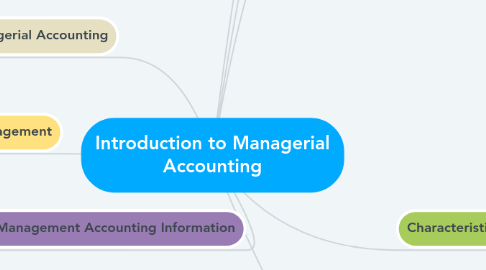
1. Managerial Accounting
1.1. Internal; management
1.2. Focus on future; Budgeting
1.3. Special purpose; Planning, controlling
1.4. Internal reports; as frequently as needed
1.5. Pertains to sub-units of the business, product or customer. (very detailed)
1.6. Need not to conform with accounting standards
2. Functions of management
2.1. Planning
2.1.1. A process of setting objectives / goals to be achieved.
2.1.2. Selection methods / strategies that will be implemented to achieve the objectives
2.2. Controlling
2.2.1. A Process to ensure that the strategy is on the right track and the goal is achieved
2.3. Decision making
2.3.1. Chose the best alternative after an analysis of the costs and revenues has been made.
3. Role of Management Accounting Information
3.1. Decision making
3.2. Planning e.g prepare budget
3.3. Planning e.g prepare budget
3.4. Controlling
3.5. Performance evaluation
3.6. Performance evaluation
3.7. Determination of cost and prices of products or services
4. An accounting process
5. Roles of Management Accountant
5.1. Helping in planning, controlling and decision making
5.2. Provide information and accounting reports.
5.3. Assist departments in achieving the organization's objectives.
6. Definition
6.1. provide financial and non-financial information
6.2. in decision making for internal users
7. Financial Accounting
7.1. Internal and external; creditor
7.2. Focus on the past; Financial Statement (annually)
7.3. General purposes; Reporting profit/loss
7.4. Need to confirm with accounting standard
7.5. Pertains to business as a whole
8. Characteristics Of Managerial Accounting
8.1. Accuracy
8.1.1. Must coincide with the needs of management functions.
8.2. Timeline
8.2.1. Information obtained at the time the information is required if delayed action can not be done.
8.3. Understandability
8.3.1. Using terms that are easily understood to ensure that the information obtained can be used to make informed decisions.
8.4. Relevance
8.4.1. accounting information must be capable of making a difference in a decision
8.5. Cost Effectiveness
8.5.1. Benefits of information must outweigh the cost of providing it.
8.6. Flexibility
8.6.1. Information is not necessarily accurate, but it is easily adaptable to the needs decisions to be made
